Are you ready to dive into the world of SEO but don’t know where to start? You’ve come to the right place. SEO, or Search Engine Optimization, is the process of improving your website to increase its visibility when people search for products or services related to your business on search engines like Google, Bing, and Yahoo. The better visibility your pages have in search results, the more likely you are to garner attention and attract prospective and existing customers to your business.
Understanding Search Engines
How Search Engines Work
Before we get into the nitty-gritty of SEO, it’s crucial to understand how search engines work. Search engines like Google use complex algorithms to scan the web for content. They do this through processes called crawling and indexing.
- Crawling: Search engines send out robots (also known as spiders or bots) to find new and updated content on the web.
- Indexing: Once a page is discovered, the search engine analyzes and stores it in a vast database called an index. When you search for something, the search engine pulls relevant results from this index.
- Ranking: Finally, search engines rank these results based on relevance and quality to present the most helpful information at the top of the search results.

Keyword Research
Importance of Keywords
Keywords are the phrases and terms that people type into search engines. They are the foundation of SEO because they help search engines understand the content of your page and match it to relevant queries. Proper keyword research can make or break your SEO strategy.
Tools for Keyword Research
Several tools can help you find the right keywords for your content:
- Google Keyword Planner
- Ahrefs
- SEMrush
- Ubersuggest
- Moz Keyword Explorer
Long-tail vs. Short-tail Keywords
- Short-tail keywords: These are short, generic terms (e.g., “shoes”) that are highly competitive and broad.
- Long-tail keywords: These are longer, more specific phrases (e.g., “best running shoes for flat feet”) that are less competitive and often more targeted.
On-Page SEO

Title Tags and Meta Descriptions
Title tags and meta descriptions are essential components of on-page SEO. The title tag is an HTML element that specifies the title of a web page, and it shows up as the clickable headline in search results. Meta descriptions provide a brief summary of the page content and appear below the title tag in search results.
Header Tags
Header tags (H1, H2, H3, etc.) are used to define the headings and subheadings within your content. They help search engines understand the structure of your content and make it more readable for users.
Content Optimization
Optimizing your content means ensuring that it is high-quality, relevant, and includes your target keywords naturally. Avoid keyword stuffing, which is the practice of overloading a page with keywords in an attempt to manipulate search engine rankings.
Image Alt Text
Alt text is a description of an image that helps search engines understand what the image is about. It’s also important for accessibility, as it allows visually impaired users to understand the content of images.
Technical SEO
Site Speed and Performance
Site speed is a crucial ranking factor. A slow website can lead to a poor user experience and lower rankings. Use tools like Google PageSpeed Insights to analyze and improve your site speed.
Mobile-Friendliness
With more people using mobile devices to browse the internet, having a mobile-friendly website is essential. Google’s Mobile-Friendly Test can help you determine how well your site performs on mobile devices.
XML Sitemaps
An XML sitemap is a file that lists all the pages on your website. It helps search engines find and index your content more efficiently.
Robots.txt
The robots.txt file tells search engine crawlers which pages they can or cannot access. Properly configuring this file ensures that sensitive or duplicate content is not indexed.
Off-Page SEO
Backlink Building
Backlinks are links from other websites to your site. They are crucial for SEO because they act as votes of confidence from other sites. The more high-quality backlinks you have, the better your site will rank.
Social Signals
Social signals refer to the engagement your content receives on social media platforms. While not a direct ranking factor, strong social signals can increase your content’s visibility and drive traffic to your site.
Influencer Outreach
Collaborating with influencers can help you reach a broader audience and generate high-quality backlinks. Influencers can promote your content to their followers, providing valuable exposure.
Local SEO
Google My Business
Google My Business (GMB) is a free tool that allows you to manage your online presence on Google, including Search and Maps. Optimizing your GMB listing can improve your visibility in local search results.
Local Citations
Local citations are mentions of your business name, address, and phone number (NAP) on other websites. Consistent NAP information across the web helps search engines verify your business’s existence and improve local search rankings.
Reviews and Ratings
Positive reviews and high ratings can enhance your online reputation and influence local search rankings. Encourage satisfied customers to leave reviews on platforms like Google, Yelp, and Facebook.
Content Creation
Importance of Quality Content
Content is king in the world of SEO. High-quality, relevant content attracts visitors, encourages engagement, and earns backlinks. Focus on creating content that provides value to your audience.
Blog Posts, Articles, and Other Content Types
Different types of content serve different purposes. Blog posts and articles are great for providing information and building authority, while infographics and videos can engage users and make complex information easier to digest.
Content Calendar
A content calendar helps you plan and organize your content creation efforts. It ensures that you publish consistently and cover a variety of topics relevant to your audience.
SEO Tools and Analytics
Google Analytics
Google Analytics is a powerful tool for tracking and analyzing your website’s performance. It provides insights into traffic sources, user behavior, and conversion rates.
Google Search Console
Google Search Console helps you monitor and maintain your site’s presence in Google search results. It provides data on search performance, index coverage, and crawl errors.
Other SEO Tools
In addition to Google tools, several other SEO tools can enhance your efforts:
- Ahrefs: For backlink analysis and competitor research
- SEMrush: For keyword research and site audits
- Moz: For SEO insights and link building
Common SEO Mistakes to Avoid
Keyword Stuffing
Overloading your content with keywords can lead to a poor user experience and penalties from search engines. Focus on natural keyword integration.
Duplicate Content
Having identical or very similar content on multiple pages can confuse search engines and harm your rankings. Ensure each page has unique content.
Ignoring Mobile Optimization
Failing to optimize your site for mobile devices can result in a poor user experience and lower rankings. Make sure your site is responsive and mobile-friendly.
Staying Updated with SEO Trends
Algorithm Updates
Search engines frequently update their algorithms to improve search results. Staying informed about these updates is crucial for maintaining and improving your rankings.
SEO Blogs and Forums
Following SEO blogs and forums can help you stay updated on the latest trends and best practices. Some popular resources include Moz, Search Engine Land, and the Google Webmaster Central Blog.
Continuous Learning
SEO is a constantly evolving field. Invest time in continuous learning through online courses, webinars, and industry conferences.
Measuring SEO Success
Key Metrics
Key metrics to track include organic traffic, bounce rate, conversion rate, and keyword rankings. These metrics provide insights into the effectiveness of your SEO efforts.
Reporting and Analysis
Regularly analyze your SEO performance and create reports to track progress. Use this data to identify areas for improvement and adjust your strategy accordingly.
SEO for Different Platforms
E-commerce SEO
E-commerce sites have unique SEO needs. Focus on optimizing product pages, using structured data, and creating compelling meta descriptions.
SEO for Blogs
Blogs should focus on creating high-quality content, using relevant keywords, and promoting posts through social media and backlink building.
SEO for Local Businesses
Local businesses should prioritize local SEO tactics, such as optimizing their Google My Business listing and building local citations.
SEO Myths and Misconceptions
Common Misconceptions about SEO
Many myths and misconceptions surround SEO. For example, some people believe that more keywords always lead to better rankings, which is not true.
Debunking Myths
Educate yourself on common SEO myths and misconceptions. Understand that SEO requires a balanced approach, focusing on quality rather than quantity.
Conclusion
SEO is a critical component of digital marketing that can significantly impact your online success. By understanding the basics, avoiding common mistakes, and staying updated with trends, you can create an effective SEO strategy that drives traffic and boosts your online presence.
FAQs
1. How long does it take to see results from SEO? SEO is a long-term strategy, and it can take several months to see significant results. Patience and consistency are key.
2. What is the difference between on-page and off-page SEO? On-page SEO refers to optimizing elements on your website, while off-page SEO involves activities outside your site, such as backlink building and social media engagement.
3. Can I do SEO myself, or do I need to hire a professional? While you can learn and implement basic SEO yourself, hiring a professional can provide expertise and save you time.
4. How often should I update my website’s content for SEO? Regularly updating your website with fresh, relevant content can improve your SEO. Aim to update or add new content at least once a month.
5. Is SEO only important for Google? While Google is the dominant search engine, SEO is important for all search engines, including Bing and Yahoo.

